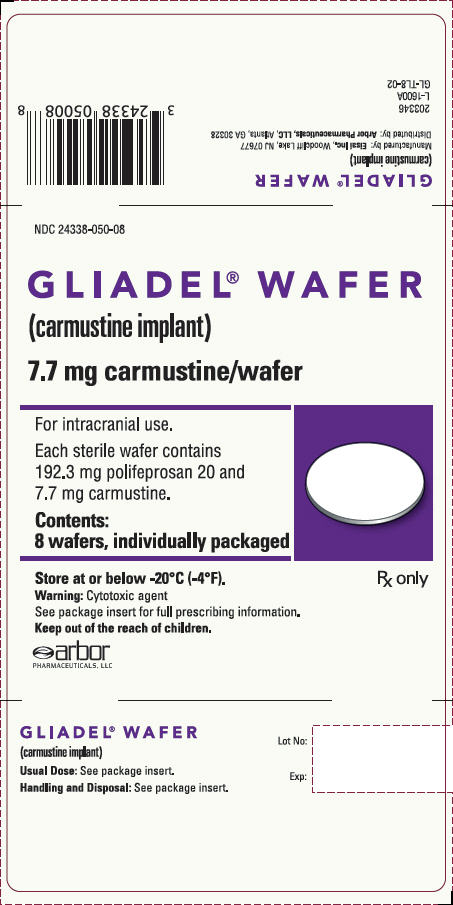Gliadel
What is Gliadel ?
Gliadel is used to treat brain cancer.
Gliadel may be given to you for other reasons.
Description
GLIADEL Wafer is an implant for intracranial use, containing carmustine, a nitrosourea alkylating agent, and polifeprosan, a biodegradable copolymer used to control the release of carmustine. It is a sterile, off-white to pale yellow wafer approximately 1.45 cm in diameter and 1 mm thick. Each wafer contains 7.7 mg of carmustine [1, 3-bis (2-chloroethyl)-1-nitrosourea, or BCNU] and 192.3 mg of a biodegradable polyanhydride copolymer. The copolymer, polifeprosan 20, consists of poly [bis (p-carboxyphenoxy)] propane and sebacic acid in a 20:80 molar ratio. Carmustine is homogeneously distributed in the copolymer matrix.
The structural formula for polifeprosan 20 is:

The structural formula for carmustine is:

Mechanism of Action
The activity of GLIADEL Wafer is due to release of cytotoxic concentrations of carmustine, a DNA and RNA alkylating agent, into the tumor resection cavity. On exposure to the aqueous environment of the resection cavity, the anhydride bonds in the copolymer are hydrolyzed, releasing carmustine, carboxyphenoxypropane, and sebacic acid into the surrounding brain tissue.
Before taking Gliadel, tell your doctor:
- If you are allergic to Gliadel; any part of this medicine; or any other drugs, foods, or substances. Tell your doctor about the allergy and what signs you had.
- If you are breast-feeding. Do not breast-feed while you take Gliadel. You may also need to avoid breast-feeding for some time after your last dose. Talk with your doctor to see if you need to avoid breast-feeding after your last dose.
This medicine may interact with other drugs or health problems.
Tell your doctor and pharmacist about all of your drugs (prescription or OTC, natural products, vitamins) and health problems. You must check to make sure that it is safe for you to take Gliadel with all of your drugs and health problems. Do not start, stop, or change the dose of any drug without checking with your doctor.
What are some things I need to know or do while I take Gliadel?
- Tell all of your health care providers that you take Gliadel. This includes your doctors, nurses, pharmacists, and dentists.
- This medicine may affect being able to father a child. Talk with the doctor.
- This medicine may cause harm to an unborn baby. A pregnancy test will be done before you start Gliadel to show that you are NOT pregnant.
- Women must use birth control while taking Gliadel and for some time after the last dose. Ask your doctor how long to use birth control. If you get pregnant, call your doctor right away.
- Men with a partner who may get pregnant must use birth control while taking Gliadel and for some time after the last dose. Ask your doctor how long to use birth control. If your partner gets pregnant, call the doctor right away.
Children:
- This medicine is not approved for use in children. Talk with the doctor.
How is Gliadel best taken?
Use Gliadel as ordered by your doctor. Read all information given to you. Follow all instructions closely.
- This medicine is placed in the brain during surgery.
What do I do if I miss a dose?
- Call your doctor to find out what to do.
What are the side effects of Gliadel that I need to call my doctor about immediately?
WARNING/CAUTION: Even though it may be rare, some people may have very bad and sometimes deadly side effects when taking a drug. Tell your doctor or get medical help right away if you have any of the following signs or symptoms that may be related to a very bad side effect:
- Signs of an allergic reaction, like rash; hives; itching; red, swollen, blistered, or peeling skin with or without fever; wheezing; tightness in the chest or throat; trouble breathing, swallowing, or talking; unusual hoarseness; or swelling of the mouth, face, lips, tongue, or throat.
- Chest pain.
- Signs of meningitis like headache with fever, stiff neck, upset stomach, confusion, or if lights bother the eyes.
- Weakness on 1 side of the body, trouble speaking or thinking, change in balance, drooping on one side of the face, or blurred eyesight.
- If seizures are new or worse after starting Gliadel.
- Change in eyesight.
- A wound that does not heal.
- Low mood (depression).
- Pain when passing urine.
What are some other side effects of Gliadel?
All drugs may cause side effects. However, many people have no side effects or only have minor side effects. Call your doctor or get medical help if any of these side effects or any other side effects bother you or do not go away:
- Upset stomach or throwing up.
- Constipation.
- Stomach pain.
- Back pain.
- Feeling tired or weak.
These are not all of the side effects that may occur. If you have questions about side effects, call your doctor. Call your doctor for medical advice about side effects.
You may report side effects to the FDA at 1-800-332-1088. You may also report side effects at https://www.fda.gov/medwatch.
Label
- NDC 24338-050-08
- GLIADEL® WAFER
(carmustine implant) - 7.7 mg carmustine/wafer
- For intracranial use.
- Each sterile wafer contains
192.3 mg polifeprosan 20 and
7.7 mg carmustine. - Contents:
8 wafers, individually packaged - Store at or below -20°C (-4°F).
Rx only - Warning: Cytotoxic agent
See package insert for full prescribing information.
Keep out of the reach of children. - arbor
PHARMACEUTICALS, LLC

If overdose is suspected:
If you think there has been an overdose, call your poison control center or get medical care right away. Be ready to tell or show what was taken, how much, and when it happened.
How do I store and/or throw out Gliadel?
- If you need to store Gliadel at home, talk with your doctor, nurse, or pharmacist about how to store it.
SRC: NLM.
